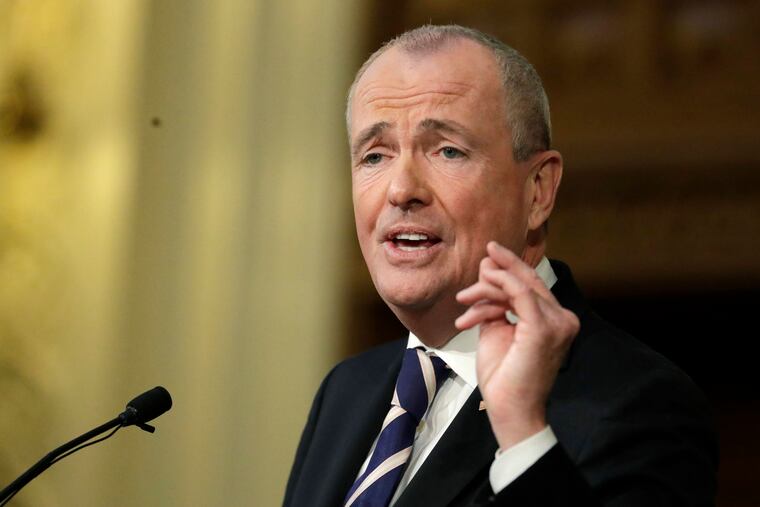New Jersey Gov. Phil Murphy wants to eliminate mandatory minimum sentences for non-violent offenders
New Jersey Gov. Phil Murphy Thursday pressed the Legislature to enact criminal justice reforms recommended by a state commission.

New Jersey Gov. Phil Murphy said Thursday that he wants to eliminate mandatory minimum prison sentences for nonviolent drug and property offenses as recommended by a state commission, in part to reduce racial inequities in punishment.
Murphy, a Democrat, was joined by Senate President Stephen Sweeney, Assembly Speaker Craig Coughlin, and Attorney General Gurbir S. Grewal, signaling a Democratic consensus to enact the recommendations outlined by the Criminal Sentencing and Disposition Commission.
That change would represent “a critical step toward eliminating the racial disparities in our criminal justice system and ensuring a system that works better for all communities,” Murphy said in a statement.
New Jersey incarcerates black people at a rate 12 times higher than white people, according to the Sentencing Project. And minorities make up 44% of New Jersey’s population but 76.5% of the state’s prison population.
In February 2018, Murphy reconvened the commission and directed it to find ways to lessen the disparity. The panel was dormant throughout the Christie administration.
“This was long overdue,” Murphy said.
The governor said he hoped a package of criminal justice reform bills could be passed in the Legislature as soon as mid-January, before the end of the lame duck session.
But the Democrats who lead the Legislature could not confirm such swift action was possible.
“The devil is in the details,” Coughlin said. “I have not had a chance yet to read the commission’s report. So I don’t want to step out and say I’m endorsing everything in there. We need to look at it first.”
Sweeney was more optimistic. “I support the commission’s recommended reforms, and I will work to have the Legislature do its part to make them a reality," he said.
Murphy administration officials were not entirely clear how many people could be affected by the changes, estimating from several hundred to a few thousand.
The 13-member commission is chaired by Deborah Poritz, the retired chief justice of the New Jersey Supreme Court, and is comprised of leaders from the Legislature, the Attorney General’s Office, and a broad spectrum of New Jersey’s criminal justice community.
“Individuals convicted of crimes should spend no more time in prison than is necessary,” Poritz said, and for people who must be in prison, “that time should be used as productively as possible.”
Among the commission’s recommendations were that mandatory minimum sentences for second-degree robbery and second-degree burglary should be reduced. Those crimes have penalties associated with far more serious offenses, according to the report.
Also, it said people currently in prison and eligible for parole should be able to have their mandatory minimum sentences eliminated or reduced, depending on their crime.
The report also calls for a quicker way to release terminally ill prisoners.
The group’s members also recommend that any savings that come from the recommendations be put into programs that help people stay out of prison, along with other crime-prevention programs.
They also seek an upgrade to the Department of Corrections database so state leaders can track “inmate trends" more closely and partner with academic institutions to better understand the data.
The commission will remain active, according to Murphy, and will plan to release recommendations every year.
“It is a beginning,” Poritz said, “a set of reforms that we believe will start to move that arc toward equal justice.”